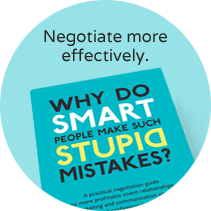Insights

Don’t be a busy fool
Busy-ness is like a disease. It gets worse over time. It’s easy to work more hours than ever before whilst not being as productive as we should be. Why do we do this? What causes it? What impact does it have on our business? How does it affect our colleagues? How does it affect us? How do we become smarter, achieve more and have more time to enjoy our lives outside of work?
There are many causes leading us to becomes busy fools. As pressure has increased during the recession a natural reaction is to run faster, work longer and work harder. The secret is about working smarter and focusing on the right priorities. Some people seek perfection in everything they do. That perfection can be unrealistic and unnecessary. Know what needs to be 80% and what needs to be 100%.
Stephen Covey talked about the “activity trap” whereby we busily climb the ladder of activity without realising it is against the wrong wall. It is easy to be too focused on the doing and the implementation and not enough on the outcomes and the end results.
Many people have a “to do list” which they diligently work their way through from top to bottom. Instead identify the top 3 actions on the “to do list”. Which are the real priorities? Focus on those first and then tackle the next 3 priorities. Develop a “to think list” identifying the key areas in which you need to spend time thinking.
The pressure to run faster can come from different sources, from clients who want everything yesterday to bosses who put pressure on you to perform. However for many of us the most amount of pressure is created by ourselves.
Bear Grylls recently ran a television series called “The Island”. A programme of survival by 13 men on a desert island striving to survive the challenges. Some of the men are focused on building a shelter, keeping a fire going and finding food and water while several other men are leaving the hard work to the others and contribute little to the ‘community’. I know which ones I’d like working in my business. Those who are self-starters, use their initiative and don’t give up at the slightest set-back. They focus on the priorities and don’t get distracted or suffer from overwhelm. In the end they elected a leader who finally pulled the group together, allocated tasks and gave direction to the group.
A fear of failure drives many people to push themselves harder. The fear can be generated by a lack of confidence or a need for approval from others, including bosses. Others procrastinate and their indecisiveness can lead to them doing nothing eventually believing that doing nothing is a safe option. Doing nothing is rarely a safe option.
What impact does all this have on us? We tell others and ourselves ‘how busy we are’ yet in reality we achieve less. I believe we become stressed, unproductive and unhappy leading to demotivation. In turn the stress reduces our creativity and quality thinking. Under pressure most of us become a less pleasant version of ourselves. Friction increases and motivation decreases.
My fear is that rushing has become the new norm. Clients make out that the rushed deadline is the most important goal. Yet once the work is delivered the tight deadline is often forgotten and the actual result is now the real critical issue for the client. Clients quickly forget the tight deadline they gave us. When we rush there is a strong likelihood we don’t produce our best work and we are more likely to make mistakes. Rushing is a ‘disease’ affecting many businesses and has become habitual for many people and businesses. I have seen teams follow the example of their boss who is a busy fool and eventually the whole team become “busy fool clones”.
What is the impact on our business? The danger is we become purely focused on the short term and not focused on the bigger picture and longer term goals. It is vital to strike the right balance between the short and long term goals. When we are too short term focused we are more likely to be over-taken by competitors as they improve their services and products and also look for new improved ways to add value to their clients.
So how can we be smarter and more productive? Here are 10 tips to help you be more effective and achieve more each day. Identify which tips are most relevant to you and focus particularly on those.
- Firstly recognise that everything that happens to you in business is your responsibility. The buck stops with you! Set aside time to plan and really think about your business and where you want be in 2-3 years time. Beware of spending too much time on what’s urgent rather than what’s important.
- “Plans are nothing, planning is everything” Eisenhower said. It is the act of thinking and planning which is more important than the actual plan. Build time into your diary every week to spend a couple of hours to think and plan – that’s only around 5% of your work-week. Ideally I’d recommend spending minimum 10% of your work week planning and thinking. Gandhi said “I used to meditate for 2 hours every day. As I have become busier I meditate for 4 hours every day” Replace the word “meditate” with “think and plan”. The busier you are the more the need to plan. Plans are relatively easy, the hard part is the execution of the plan. Stephen Covey stressed “Begin with the end in mind” Be clear of your end goals and where you are trying to get to.
- Get better at what you do. In fact be the very best at what you do. Be outstanding at a few things, not average or mediocre at many things. Find your niche and specialise. Aim to be in the top 10% of your peers at minimum.
- Get away from your desk to think creatively and innovatively. Typically our best ideas and thinking come spontaneously when we least expect them. Identify when you get your best ideas. It may be in the shower, walking, swimming or chilling with a glass of wine which is one of my favourites! There is no single right way. Find your way.
- Push back on ridiculous deadlines unless it is a crisis or if there is a real need to move fast. Will you always get more time? Of course not but you will much of the time. Beware of automatically saying ‘yes’ without thinking. Develop your assertiveness and your ability to say no appropriately and push back.
- Solving problems by yourself can be tough and sometimes overwhelming. Find a buddy to chat through problems. Explaining and articulating your challenge to them forces you to clarify your thinking by putting the challenge into words. Your buddy will probably also give you a different and fresh perspective.
- Don’t procrastinate. Do it, delegate it or dump it. Be decisive. Don’t sit there wondering where to start. Get started. Don’t just do what you find easy and in your comfort zone. Do what’s effective. Do what’s needed.
- Systematise. Find ways and processes to streamline those repeated tasks. Beware of re-inventing the wheel each time. This can reduce the time taken and improve the quality of the output.
- Take time to anticipate what is likely to happen and be said at important meetings. You can then prepare your options and response in advance without the pressure ‘in the moment’. Think thorough the implications of your decisions and different options.
- For one week keep a detailed diary to see where you are really spending your time. Is that the best use of your time? How could you reduce your time working and be more effective during that time? How much time is spent checking emails? It is easy to become hooked on checking emails every 5-10 minutes. Could you reduce that to once an hour, and then once every couple of hours?
Finally let me leave you with “The Three Rules of Business” from Michael Raynor and Mumtaz Ahmed. I love the simplicity and clarity of their thinking.
- Better before cheaper.
- Revenue before costs.
- There are no others rules. In other words nothing else matters.
These rules came from their insights looking at 344 companies which had achieved exceptional performance. Use these three rules as your guiding light and you are highly unlikely to ever be a ‘busy fool’ again.
Published in Sales Initiative
no comments
